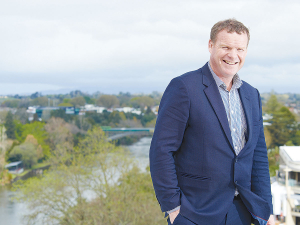Farmer confidence dips slightly, but positivity still dominates
Farmer confidence has taken a slight dip according to the final Rabobank rural confidence survey for the year.
 Rabobank New Zealand chief executive Todd Charteris says the improvements in farmer sentiment were fuelled by a strong commodity pricing outlook.
Rabobank New Zealand chief executive Todd Charteris says the improvements in farmer sentiment were fuelled by a strong commodity pricing outlook.
Rabobank's latest rural confidence survey has revealed a 13% rise in farmer confidence despite concerns about government policy.
Completed in June, the survey found the number of farmers expecting the rural economy to improve in the next 12 months had increased to 32%, marking a 3% rise from last quarter.
Rabobank New Zealand chief executive Todd Charteris says the improvements in farmer sentiment were fuelled by a strong commodity pricing outlook.
This is despite increasing concerns regarding government policy and the impact of labour shortages, he says.
“Farmers are now more positive about the prospects for the agricultural economy in the coming 12 months. And the key reason for this is rising commodity prices, with this cited by well over half of those holding an optimistic view of the year ahead,” Charteris says.
He adds that pricing for New Zealand’s key agricultural exports, like dairy, has held up well over recent months, with prices expected to remain strong moving into the second half of 2021.
“Since the last survey in March, dairy farmers have been buoyed by continuing strong Chinese demand for Oceania-origin dairy imports which helped maintain pricing at elevated levels. In addition, we’ve seen Fonterra announce a strong opening season forecast for the 2021/22 season of $7.25 to $8.75/kgMS, with a mid-point of $8,” Charteris says.
The increase in farmer sentiment comes despite rising concerns regarding government policy.
“Of the one in five farmers with a pessimistic view of the agricultural economy, 82% cited government policy as a key reason for concern. And while we’ve seen government policy feature as the major concern for farmers across recent surveys, this percentage is an increase on recent quarters,” Charteris says.
He says several policies could be causing unease among farmers but the spike is something likely caused by the recently finalised advice from the Climate Change Commission.
Charteris says farmers indicated labour shortages are a significantly larger issue than a year ago.
He says 43% of farmers say the issue has worsened.
“The responses to these questions reflect the conversations we’re having with our clients on this topic, and it’s clear industry leaders and government still have plenty of work to do to mitigate the strain of worker shortages.”
Legal controls on the movement of fruits and vegetables are now in place in Auckland’s Mt Roskill suburb, says Biosecurity New Zealand Commissioner North Mike Inglis.
Arable growers worried that some weeds in their crops may have developed herbicide resistance can now get the suspected plants tested for free.
Fruit growers and exporters are worried following the discovery of a male Queensland fruit fly in Auckland this week.
Dairy prices have jumped in the overnight Global Dairy Trade (GDT) auction, breaking a five-month negative streak.
Alliance Group chief executive Willie Wiese is leaving the company after three years in the role.
A booklet produced in 2025 by the Rotoiti 15 trust, Department of Conservation and Scion – now part of the Bioeconomy Science Institute – aims to help people identify insect pests and diseases.